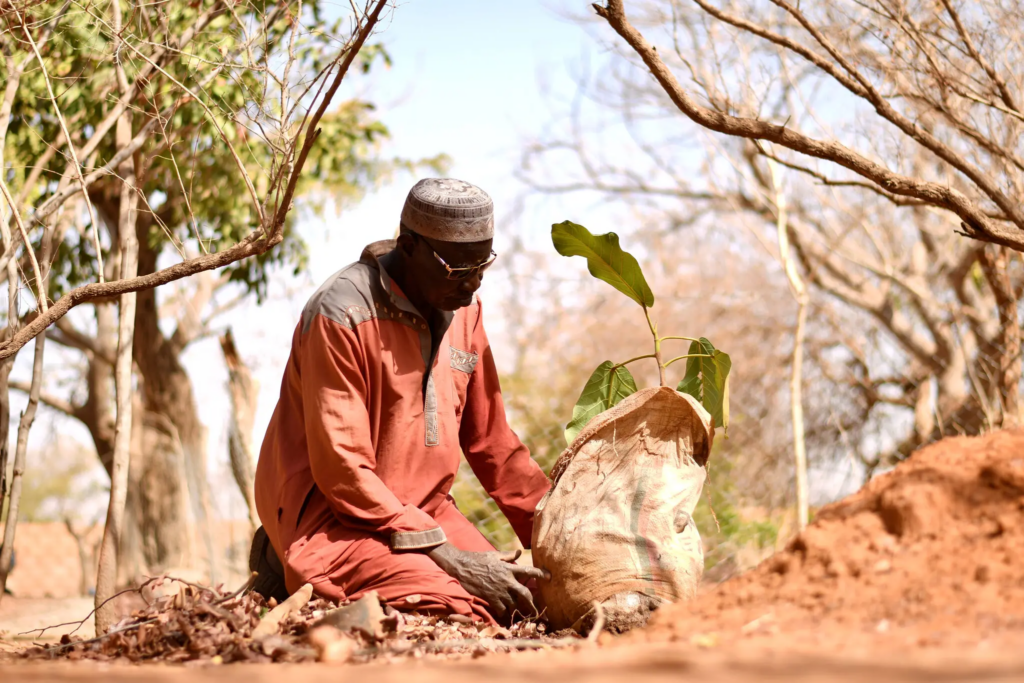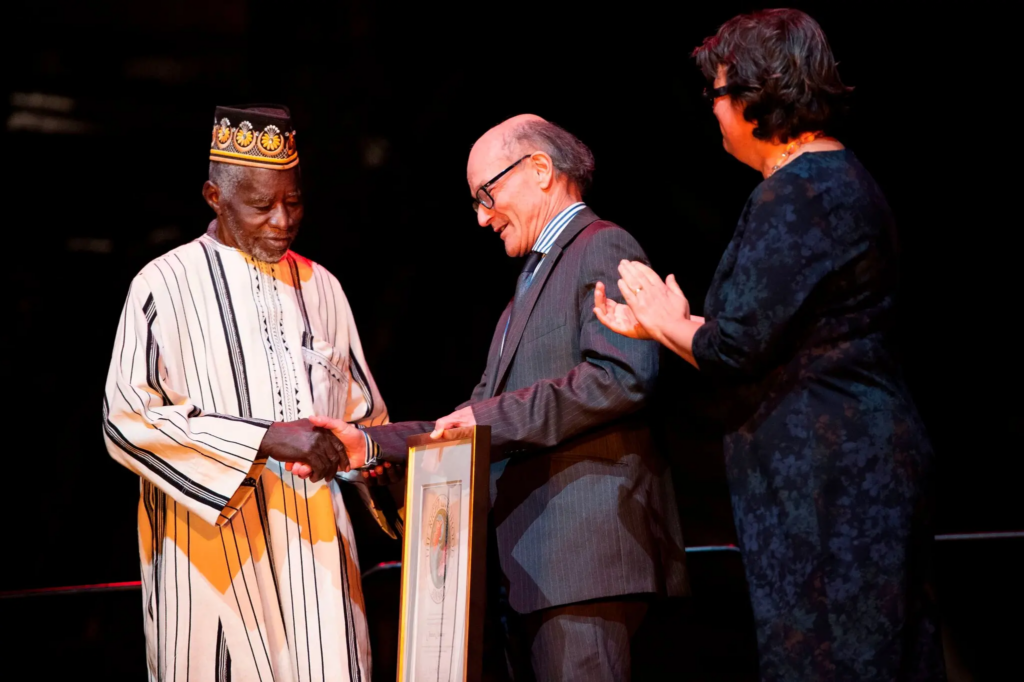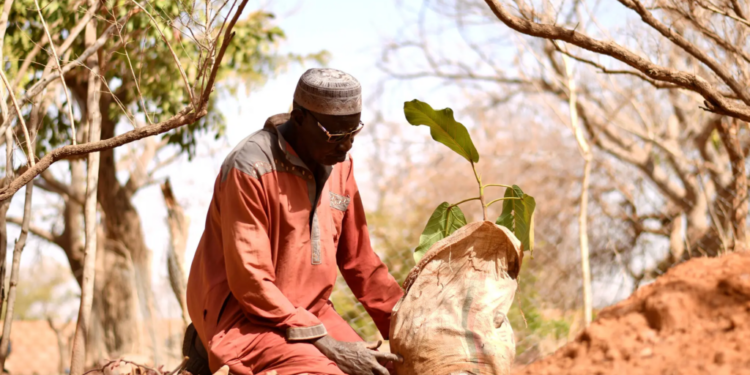Yacouba Sawadogo, a farmer known as “the man who beat the desert” in Burkina Faso for revolutionising agricultural methods and creating a 75-acre forest on barren land, died on Dec. 3 in Ouahigouya, a northern provincial capital in that West African country. He was 77.
His death, in a hospital after a long illness, was confirmed by his son Loukmane Sawadogo.
Mr Sawadogo, a lean, taciturn man who never learned to read or write, received a hero’s welcome when he returned home to landlocked Burkina Faso in 2018 after winning the Right Livelihood award in Stockholm, created in 1980 to honour social and environmental activists. A throng greeted him at the airport in Ouagadougou, the country’s capital, and he was received by the country’s president at the time.
Years before, fellow villagers in his arid, windswept country in the north had called him a madman for implementing a simple improvement to an age-old water conservation technique. But Mr Sawadogo had the last laugh: The forest he created, with more than 60 species of trees and shrubs, had no equal in the Sahel, the semidesert region stretching across Africa’s upper third, forestry experts said.
The Sahara’s encroachment, abetted by decades of indiscriminate tree-cutting and now climate change, with decreased rainfall, is a major threat to an already fragile region. Large swathes of land have been stripped of trees, from the Gulf of Guinea right up to the desert.
By the end of his life, Mr. Sawadogo was recognized as one of the few who had successfully pushed back. Farmers using his techniques have more than tripled their grain yields, in an area where agriculture must depend on sparse rain. Burkina Faso, the world’s 22nd poorest country, has an average life expectancy of under 63.

Chris Riej, a Dutch geographer and a senior fellow of the World Resources Institute in Washington, said of Mr. Sawadogo in a phone interview, “He single-handedly has had more impact on soil and water conservation than all the experts combined.” He added: “He managed to build a forest out of nothing, a forest of 30 hectares with the largest biodiversity in the Sahel. At the end, he became a sort of national hero.”
Mr. Sawadogo won the United Nations Champions of the Earth award in 2020. Luc Gnacadja, former head of the U.N.’s anti-desertification program, said in an interview from bordering Benin: “He was exceptional. A whole zone that had been desertified was transformed.”
Mr. Gnacadja invited Mr. Sawadogo to be the keynote speaker for a high-level conference in Switzerland. “He explained, in all humility, what he had done,” he said, “and he left us a legacy that shows that degradation of ecosystems is not inevitable.”
Mr. Sawadogo had an almost mystical relationship to the trees he brought into being — the marula, the acacia, the gum arabic, the desert date tree — treating them “like humans,” his cousin Arouna Sawadogo said in an interview from Burkina Faso. When arsonists, jealous of Mr. Sawadogo’s success, torched his forest several times in the 2000s, the cousin said, Mr. Sawadogo was “an old man with a sad face; he stayed in the ashes for several days.”
But he always bounced back, telling his son Loukmane, one of his 27 children by three wives, “Even if I have a little bit of force left, even for one minute, if there is a tree to plant, I will do it.”
It took years of hardship — drought, famine and shifting political winds in a country where strongmen rulers alternate through coups d’état — for Mr. Sawadogo to effect his transformation from suspect outsider to figure of respect, sought after by farmers throughout the Sahel for his counsel.
“Some people just do whatever they want with our forests,” Mr. Sawadogo said in a 2010 film about him, “The Man Who Stopped the Desert,” by the British producer and director Mark Dodd. “When you are serious and start work that others don’t appreciate, then they treat you as a madman.”
He recalled: “People wouldn’t even speak to me. They said I was a crazy man.”
Mr. Sawadogo’s heresy revolved around transforming the practice of what local farmers called zaï — digging small pits to capture precious rainwater. These farmers typically waited until the start of the rainy season, at the beginning of summer, to dig the zaï.
But Mr. Sawadogo began well before, when the earth was bone-dry. And he dug the pits wider and deeper. He put manure and rocks in the bottom of them. He made use of termites to help break up the land. The manure contained seeds. When the rain came, the rocks helped retain the water, and the water turned the seeds into seedlings, which he nurtured. The soil would stay moist for several weeks after the rainfall.

“The results were striking; the soil improved along with his crop yield,” the U.N. said in announcing his award. “He was able to grow trees in the arid ground.”
Mr. Sawadogo eventually helped the process along, planting trees himself. Trees protected crops from the wind.
“As soon as I understood how important trees were, I set to work on planting the forest,” he said in the film. Mr. Reij, of the World Resources Institute, said, “For him the trees became more important than the grains.”
Yacouba Sawadogo was born on Jan. 1, 1946, in Gourga, a village about 110 miles north of Ouagadougou, to Adama Sawadogo, a farmer, and Fatimata Bilem. When he was very young his parents sent him to a Quranic school in Mali, where, he recalled in the film, the leader of the school told him he was destined for great things.
When he returned home as a teenager he opened a stall selling motorcycle parts in the market in Ouahigouya, the provincial capital. It was successful, enabling him to put aside money. But he was restless and yearned to return to the land, he later told interviewers. Stacking the odds against him was the looming drought that devastated the Sahel from the mid-1970s, when he left the market, to the mid-1980s.
Rainfall decreased by 30 percent. Whole villages were abandoned because farmers were no longer able to feed their families. “It was a bit of an environmental disaster,” Mr. Reij said. It became urgent to conserve what little rainfall there was, and to use it productively. Mr. Sawadogo began experimenting.
The improved zaï — he put millet seeds in the pits as well — led to a tripling of his grain yield, allowing him to feed his family for three years, he told one interviewer in 2011.
By the 1990s, researchers as well as farmers were coming to study his methods; Niger alone sent 13 farmers. Fame for Mr. Sawadogo and trips abroad followed. He participated in a United Nations COP conference on climate change and testified before congressional staffers in Washington.
“He was a bit like the trees he wanted to protect, simple and accessible,” Luc Damiba, a honey producer and film festival director in Burkina Faso, said in an interview.
After the last fire, at the urging of Burkina citizens, the government built a fence around Mr. Sawadogo’s forest, Mr. Reij said.
In addition to his son Loukmane, Mr. Sawadogo is survived by his three wives, Safiata, Khaddar Su and Raqueta, and his 26 other children.
“He managed to find resources to stand up to drought,” said Mr. Gnacadja. “That’s called adaptation.”
DISCLAIMER: The Views, Comments, Opinions, Contributions and Statements made by Readers and Contributors on this platform do not necessarily represent the views or policy of Multimedia Group Limited.
- President Commissions 36.5 Million Dollars Hospital In The Tain District
- You Will Not Go Free For Killing An Hard Working MP – Akufo-Addo To MP’s Killer
- I Will Lead You To Victory – Ato Forson Assures NDC Supporters
Visit Our Social Media for More




